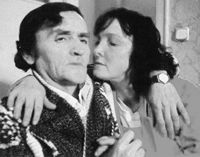
|
 |
Sweep
It Up, Swig It Down
Kehrein, Kehraus
|
GERMANY
/ 1997 / German / Color, B&W / 35mm (1: 1.66) / 70 min
Director: Gerd Kroske
Script: Gerd Kroske, Manuela Martinson
Photography: Dieter Chill
Editing: Karin Gerda Schöning
Music: Todenhöfer
Sound: Uve Haußig
Production Company, Source: realistfilm Gerd Kroske
(in cooperation with ZDF / 3sat)
Börnestr.1, D-13086 Berlin, GERMANY
Phone: 49-30-9278213 / Fax: 49-30-9258701
E-mail: kroske@t-online.de

|
|
Gerd Kroske
Born in Dessau (former GDR) in 1958. After an apprenticeship in construction,
he began his film career as a screenwriter for DEFA Documentary Studio
in Berlin in 1987. Has produced his own documentaries since 1989.
Several of his films have received awards at festivals including
Leipzig Autumn (1989) which won the International Jury Award at
the Leipzig International Documentary Festival 1989; Sweeping
(1990) which took the same award in 1990. Terminus Brest (1993/94)
received the Grand Prix at Cinéma du réel, Paris in
1995, and Galera (1996/97) won the Grand Prix for documentary
at the 4th Alternative International Festival of Independent Cinema,
Barcelona in 1997. Other films include Clever Women-Bright Girls
(1991), and Short Circuit (1993). 
|
This 1997 picture picks up the lives of Gabi, Stefan and Henry, three
street sweepers in Leipzig, after their appearances in director Kroske's
Sweeping (1990). In the opening the three appear with what
seems to be a portrait of themselves during the filming of the previous
film. The earlier monochrome piece is subsequently projected onto
the screen of an empty theater. There the three move more deftly than
today as they diligently clean the streets. Now they have already
reached old age and have quit street sweeping, yet their lives are
still not secure.
While interspersing scenes of street sweeping and construction work
in present-day, mechanized Leipzig, Kroske presents the severe city
lives of each of his troubled protagonists. It is hard to gaze upon
their gloomy expressions, but the effectively controlled camera neither
overlooks them nor forces sympathy upon the viewer. This is a work
of strange charm. [Sato Shin]
Director's
Statement
In my documentaries I am interested in people and their personal stories.
People who are not living on the sunny side of life, those who are
lost in our high-speed media TV-commercialization. The conflicts in
people's lives let me experience how others handle their piece of
life as well as to describe a certain feeling of life far from the
elegant gossip and thought of the spirit of the age. Filmic narrative
about the everyday effort in these giddy-paced high-risk times.
|
  |
|
before  next next
|
COPYRIGHT:Yamagata International Documentary Film Festival Organizing Committee |